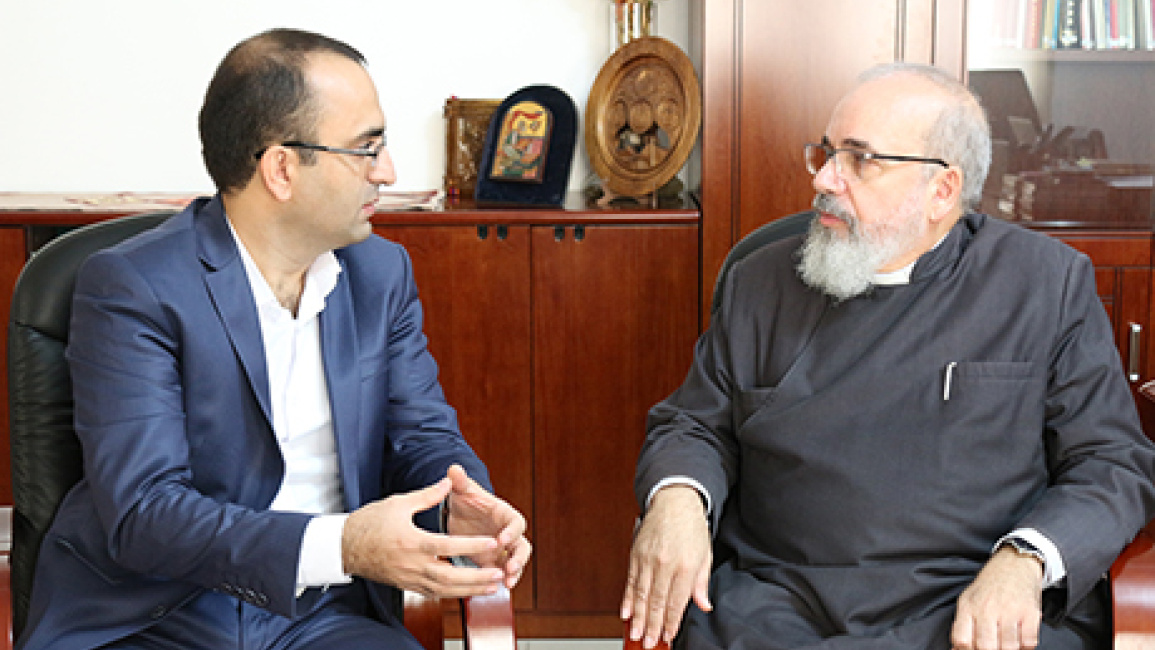- Main
- Node
- DEPUTY DIRECTOR OF YSU IAS PARTICIPATES IN PRESENTATION OF THE BOOK “LETTERS OF ARAM MANUKYAN” IN LEBANON AND DISCUSSES FURTHER COOPERATION WITH REPRESENTATIVES OF LOCAL ARMENIAN COMMUNITY
October 31, 2018 | 17:00
Society
DEPUTY DIRECTOR OF YSU IAS PARTICIPATES IN PRESENTATION OF THE BOOK “LETTERS OF ARAM MANUKYAN” IN LEBANON AND DISCUSSES FURTHER COOPERATION WITH REPRESENTATIVES OF LOCAL ARMENIAN COMMUNITY
On September 24 the presentation of the book “Letters of Aram Manukyan” was held in Lebanon, and the Deputy Director of YSU Institute for Armenian Studies Mher Hovhannisyan was invited to make a review.

The presentation was organized in Lebanon by the Lebanon department of Hamazkayin Armenian Educational and Cultural Society. The presentation of the book in Lebanon is the fourth one. The first was held at Yerevan State University, the second-in Shushi, the third-in Syria and the last one-in Lebanon.
“Three years ago, in Lebanon we spoke about the publication of the book with the complier of the book, historian Yervand Pambukyan. The collection involves about 400 letters the majority of which have never been published. By the way, the documents were mainly collected from the archive of the Armenian Revolutionary Federation Party in Boston”, informed Mr Hovhannisyan in his interview to ysu.am.
The publication of the book was held due to joint efforts. The head of the IAS Laboratory of Armenian Historical Geography and Cartography after Babken Harutyunyan, V. Mkhitaryan designed the map of the activity carried out by Aram Manukyan in 1904-1915.
As a result of the meeting of YSU Rector Aram Simonyan with the historian Yervand Pambukyan held prior to the 100th anniversary of the Frist Republic, it was decided that YSU was to undertake the highlighting of the book.
“Publication of this book was unprecedented for the University as it was printed in 1000 samples”, said Mher Hovhannisyan.
In his review Mr Hovhannisyan also mentioned that Aram Manukyan had always believed that he was not alone in his work and was against being considered as a savior. He was against the cult of personality. Via these letters it becomes possible to get to know critic Aram Manukyan, to familiarize oneself with Aram Manukyan’s image as a teacher.
Mr. Hovhannisyan also noted that within the scope of the Lebanon visit he took part in the negotiations with YSU partner organization of the community.
Since 1991 Yerevan State University has been the partner of Hamazkayin Central Department of Lebanon. The Institute for Armenian Studies of YSU expanded the cooperation frames in 2011 and created new ties for the Armenian community. It refers to local Armenian schools, the National Patriarchate, the district department of Lebanon of Hamazkayin and different structures catholic and apostolic communities, said the Deputy Director.
“During this visit we got the opportunity to refresh our agreements as the administration of some structures, in particular, the National Patriarchate and Hamazkayin district department had changed. Due to the agreements a good job was done. In fact, we implemented only one project with Hamazkayin district department, i.e. the presentation of this book, but with the national Patriarchate we discussed the coming implementation programs”, said Mr. Hovhannisyan and added that in winter they are going to start the Lebanon series of distant study program entitled “Genocide Studies” The issue of re-training of Lebanon Armenian teachers working under the Patriarchate jurisdiction were discussed.
The Deputy Director of IAS that in near future they are going to discuss the issue of implementing cartography activities and there are no large-format historical maps in Western Armenian in schools.
Mr Hovhannisyan also added that their programs are shown support by community structures among which is AFHIL organization engaged in insurance of Lebanon Armenian community.
“Communities provide our accommodation and transportation fees. Each of us understands his responsibilities and part of work”, concluded the Deputy Director of YSU Institute for Armenian Studies Mher Hovhannisyan.

